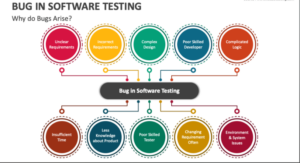Despite the fact that Artificial Intelligence (AI) is a potential technique to make the process easier, faster, and clearer, software testing carried out by human resources still has importance. Software testers may eventually have to start looking for work elsewhere due to growing AI technologies. But avoid being fooled by such predictions. AI and machine learning implementation strategies are far from ideal, and businesses still face many difficulties.
The employment of AI by QA specialists would improve the entire testing process, advance testers’ professional abilities, and support corporate growth, it is certain. The way AI approaches Software testing will be of high benefit in the future.
What will AI integration bring to the testers?
1.Enhanced Accuracy
For source and data processing in traditional testing, human resources are still needed. But let’s be honest: even the most skilled QA engineers are susceptible to errors, and that’s okay. Because of the abundance of data, the testers lose focus on software QA and miss some crucial flaws. Consumers pick up on the bugs before project stakeholders do.
Such circumstances typically harm a brand’s reputation and a product’s position in the market. And that’s where Artificial intelligence (AI) and machine learning technologies are used. Systems are instructed on how to learn source analysis and use knowledge afterward. As a result, AI testers produce more accurate results. Using AI tools to analyse data reduces the likelihood of human mistakes, speeds up testing, and helps discover potential flaws. The QA crew is not overworked by handling enormous amounts of data as a result.
2.New Position for Testers
2023 AI testing holds promise for increasing the effectiveness of the entire testing process. QA engineers will learn new abilities as it takes on a significant portion of the workload associated with test execution. Working with AI necessitates a variety of skills in areas such as algorithmic analysis, business intelligence, arithmetic optimization, and neuro-linguistic programming. Despite the fact that AI is becoming more widely used, the World Quality Report’s analysts predict a shortage of such highly trained personnel. Therefore, the businesses will need to make investments in the skills development of their QA teams.

Three new positions for QA engineers are suggested by the most recent World Quality Report:
- AI test experts: They must develop machine learning algorithms, comprehend mathematical models, and work on natural language processing paradigms in addition to the conventional testing skills.
- QA strategists for AI: The role of AI in business operations is the focus of this team. They discover ways to integrate AI quality assurance processes into the entire business lifecycle thanks to their extensive knowledge of data flow, maths optimization, and robotics methodologies.
- Data scientists: QA team members sift data, employ statistics, and do predictive analysis to create the necessary models for an AI-based QA strategy.
There are forecasts that the test automation team will evolve from QA engineers. They will assume a supervisory position and train AI to carry out various tests. Software Testing Help’s founder, Vijay Shinde, thinks AI would eventually take up approximately 70% of the repetitious testing area. In any case, people will be required to oversee test results and concentrate on the final 30% of testing, which involves, for instance, user scenario tests.
Furthermore, tooling, workflow modelling, and environment setup continue to fall under the purview of test managers. While AI may be a clever assistance for repeated testing, a QA engineer is the one that keeps track of the progress, evaluates the test plan, and takes charge of the QA strategy and objectives. “Humanity is defined by our intelligence, and AI is an extension of that quality,” said Yann LeCun, a French computer scientist.
Predictive Analysis.
The same World Quality Report data suggests that 64% of businesses will incorporate AI into their quality assurance initiatives to enhance customer operations. The market for IT services is constantly expanding, so companies must find a means to anticipate client wants and gain an advantage over rivals. Predictive analytics for software testing businesses have a challenging job. AI and machine learning could help in the quick analysis of client data to determine their preferences for new features and goods.

Machine Learning in Testing
The technology of machine learning (ML) is based on pattern recognition. The algorithms examine massive amounts of data to find predictive trends. The automation testing methodology is changed in this way since ML can be tested without a user interface. The automated QA procedure largely focuses on the back end.
1.UI tests.
While focusing on end-user experience, the employment of ML bots may be beneficial. The majority of contemporary apps follow the same design, functionality, or interface patterns. An online store, for instance, makes it simple to access a shopping cart, a product filter, and a payment window. In comparison to regression testing, bots can be trained to perform more test cases in a certain software domain. Visual validation tools used in conjunction with image-based testing are a current trend that machine learning understands. An easy machine learning test could be developed by QA engineers to detect visual bugs in software automatically.
2.APIs.
ML testing initiatives aid in doing a thorough examination of the API layer. While a tester is not forced to make several API calls, the algorithms handle the analysis of test scripts.
3.Strategy-orientation.
A full test suite is frequently executed by QA engineers just because of a few minor code modifications. The use of ML tools makes it possible to specify the minimum number of tests that must be executed to verify the applicability of code updates. Additionally, it examines the state of test coverage and vulnerable software areas.
Challenges on the Way
It is not that simple to make AI a reality, despite the fact that it appears to be a pillar for the future of QA. The use of AI in software testing is being hampered by a number of issues.
1.Ever-Bigger Data.
The processing of unstructured data necessitates the addition of personnel and funding. Currently, corporations struggle to handle complex data analysis and are unable to deploy robotics or cognitive platforms.
2.Integration of AI.
Companies are now failing to identify the business sectors that AI technologies can help to enhance. Additionally, the majority of QA firms are unable to approach AI technologies. Before AI and the business lifecycle can emerge, the teams must first develop their competence.
3.Lack of AI knowledge.
As was already mentioned, intelligent testing broadens the knowledge and competence of testers. It is simply a matter of time before this gap gets filled. However, as more and more companies experiment with “intelligent QA,” the demand for experienced professionals for AI testing in 2020 will rise.
Tools for AI-driven Test Automation
Without a doubt, AI will eventually take over. However, we think there is still plenty of time until AI takes over the entire testing process, regardless of the assumptions. Due to cutting-edge AI automated testing solutions, business and QA engineers frequently discuss the so-called “third wave of testing automation” today.
Let’s examine a few of them:
1.Eggplant AI.
This version leverages sophisticated data correlation to explore software, predict flaws, and address problems. It offers a graphical analysis of test coverage and outcomes and allows for the automation of any test automation engine.
2.Appvance.
The program uses machine learning to provide a thorough examination of software and generates “app blueprints” models using cognitive generation. The blueprints guarantee to produce several test cases quickly. Appvance also suggests Test Designer, a record-and-playback feature, in addition to AI. Data-driven testing, screenshot comparison, and DOM or AJAX auto-capture are all combined with Test Designer.
3.Applitools.
Applitools is an AI-powered visual testing tool. The anticipated design of an app is outlined with the aid of intelligent cognitive vision. Applitools provides a visual comparison method to find any discrepancies in an app’s user interface and report them. The program is effective at running automated testing and can quickly identify thousands of interface irregularities.
4.Test.ai.
It recognizes the software’s screens and component parts and activates an app to run test cases. The tool adapts to any modifications made to an element and even detects the parts that need to be corrected manually.
5.Testsigma.
a continuous automated testing tool powered by AI. It writes high-quality autotests using natural language testing processing. In order to avoid unexpected test failures, Testsigma selects the pertinent test cases for the test run.
Conclusion
A team of testers can gradually evolve away from the conventional path of manual testing models and toward an automated and precision-based continuous testing procedure thanks to AI. The QA professionals must view AI bots as a helpful addition that will lighten the load and simplify the life of a tester. Finally, there are other branches of AI that apply to QA that can be useful to tech professionals.





























